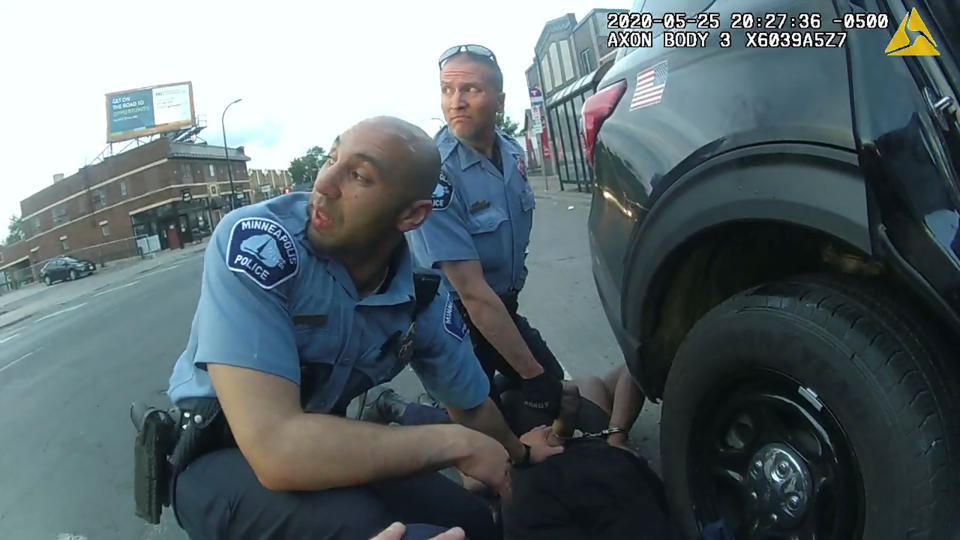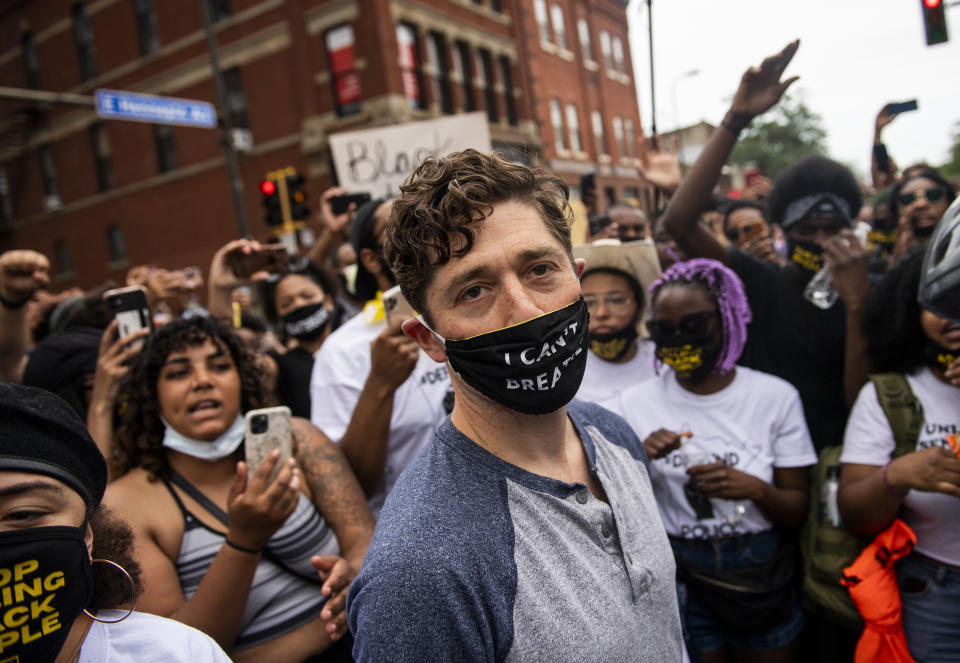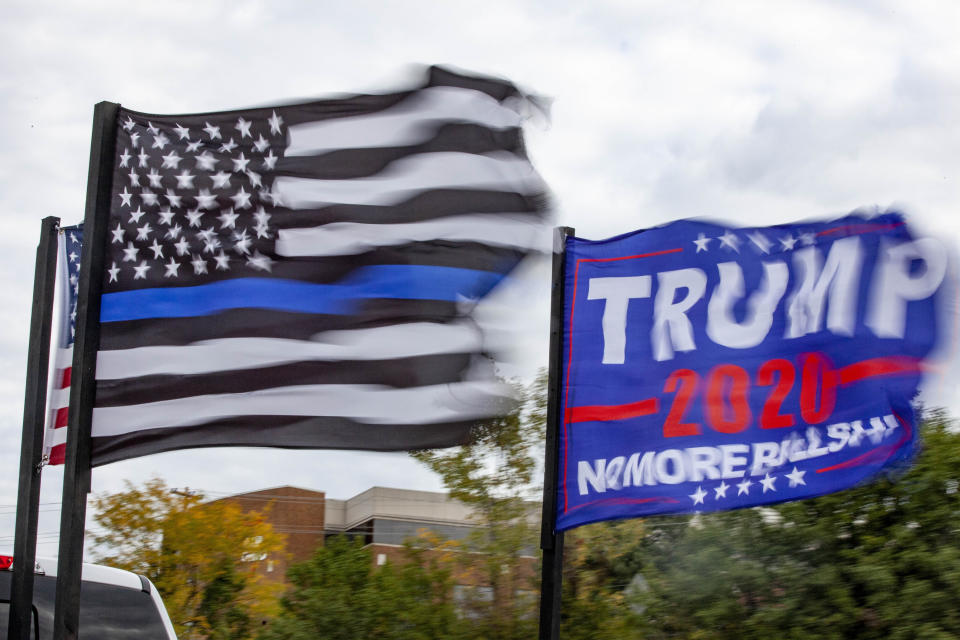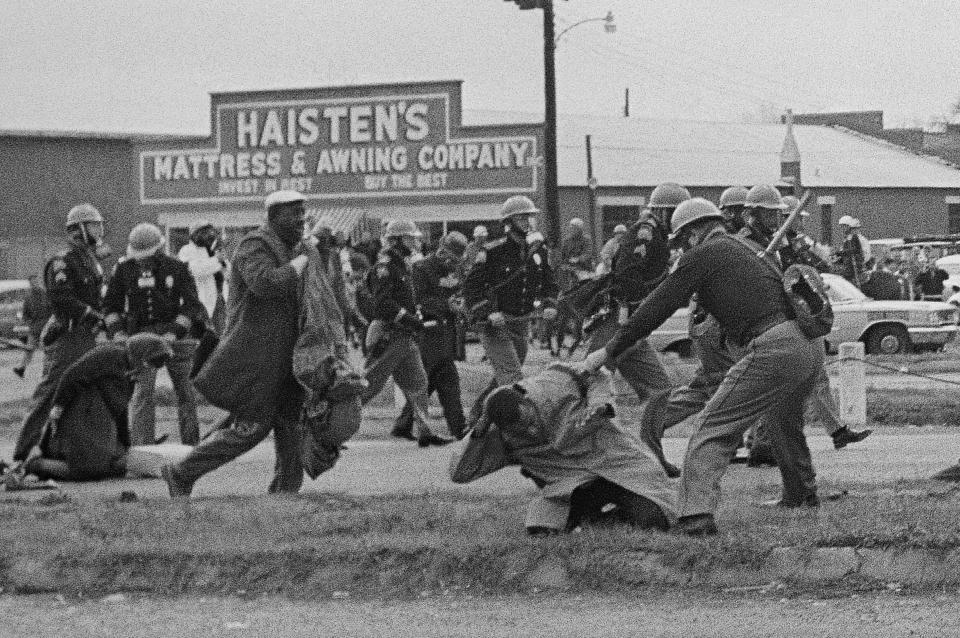Police reach breaking point amid protests, pandemic, rising crime
The killing of George Floyd by Minneapolis Police Officer Derek Chauvin sparked months of protests and political debate about whether systemic racism is embedded in American law enforcement and what should be done to root it out.
While the video of Floyd’s death beneath Chauvin’s knee proved shocking for many who watched it, for Black Americans it was just the latest example of a long-poisoned relationship with police that has led to heightened scrutiny of how law enforcement is carried out.
But amid rising crime rates, a polarizing election and the continued high-profile police killings of African Americans, some officers now say they too have reached their limit.
“This is probably one of the most volatile periods of policing that I’ve seen in my 30 years in law enforcement and now five years continuing to work with law enforcement,” Frank Straub, a former Spokane, Wash., police chief who now runs the Center for Mass Violence Response Studies at the National Police Foundation, told Yahoo News.
Police leaders told Yahoo News that they’ve worked in law enforcement for decades and can’t recall a tougher time to be an officer.
“I’ve been in policing for 34 years now,” Houston Police Chief Art Acevedo told Yahoo News. “And I would say that this is probably the most challenging period of my career.”

Floyd’s death spurred nationwide Black Lives Matter protests against police brutality this summer, and was just one of many such incidents that inflamed tensions between police and the public and led to calls for bold reforms. A Pew Research poll taken in June found that 67 percent of Americans expressed at least some support for Black Lives Matter protests. But as those protests continued throughout the summer, with some turning violent, that support fell to 55 percent.
At the same time, Americans who said they support the police became increasingly outspoken. At campaign rallies and counterprotests, they even adopted their own visual symbol — a black, white and blue American flag — to signal their support of law enforcement officials.
“I grew up in Los Angeles. [I was] a member of the California highway patrol,” Acevedo said. “I lived through the riots after the Rodney King beating in L.A. But the difference between then and now is the mistrust of government, the mistrust of the policing profession.”
A police deputy chief in the Midwest, who spoke to Yahoo News on the condition of anonymity due to concerns about his safety, said he believes officers feel “misunderstood, mischaracterized and that we are being perceived as anything other than what we truly are, which are people trying to make a difference in their communities.”

Perhaps unsurprisingly, morale has dipped among officers this year, law enforcement officials told Yahoo News.
“When you have a council that says we want to defund you, when we have elected officials that say that we’re rotten to the core and beyond redemption, yeah, morale is going to be down,” John Elder, a spokesman for the Minneapolis Police Department, told Yahoo News in September.
In August, amid an uptick in homicides and shootings in the city, a lawsuit was filed against the Minneapolis City Council and Mayor Jacob Frey by a group of residents and former councillors who say officials aren’t employing enough officers in the city.
“Minneapolis is in a crisis,” the suit, filed on Aug. 17, said. “At the beginning of the year, Minneapolis employed and deployed a police force of about 825 officers, in excess of the required minimum. However, in just the first seven months of the year, at least 80 officers have retired or quit, up dramatically from the annual average of 45.”
Due to the “hostile working conditions created by Mayor Frey and the City Council,” the lawsuit said, more than 200 officers applied for disability by the end of July (about 20 percent of the department) and 111 officers were “on some type of medical leave, including 40 PTSD claims filed just since May 26.”
A spokeswoman for the city told Yahoo News that the police department has 834 sworn officers and 141 civilian employees, as of Oct. 15.

Citing a lack of resources, inadequate funding and waning institutional support, law enforcement officials predict that a mass exodus from police forces nationwide is imminent.
“We’re seeing it now,” Straub said. “We’re seeing senior-level people that are eligible for retirement are retiring. We’re seeing a number of instances across the country where people are saying, ‘I’m done. I don’t want to be a police officer anymore.’”
Acevedo, the president of the Major Cities Chiefs Association, said his organization consists of chiefs from 69 of the largest cities in the U.S. and Canada. Of those 69 chiefs, 18 stepped down or were removed between March and October.
“The easiest thing you can do to show that you’re trying to make a change is to just get rid of a police chief,” he said.
Responding to the Minneapolis lawsuit, a spokesperson for Frey told Time magazine that Frey has “consistently supported Chief [Medaria] Arradondo and has worked to help him secure the resources he needs to recruit new officers and shift the department’s culture.”
Support for police — and how that support is defined by law enforcement officials and advocates — was cited as the reason given by many unions for their endorsement of President Trump over his Democratic opponent, Joe Biden, in the presidential election, a move that for some was rare or unprecedented.

“Generally speaking, [the Texas Municipal Police Association] doesn’t get involved in national-level elections,” James Bono, a spokesman for the Texas police union, which endorsed Trump on Sept. 3, told Yahoo News. Bono said the union generally endorses both Republicans and Democrats at the state level.
The decision to endorse Trump, Bono said, was made “because of [the] one-sided way things were going. You weren’t hearing a lot of ‘backing the police’ rhetoric out of the Biden camp. You weren’t hearing anything about looting and rioting being bad, and you weren't hearing, ‘Hey, let’s, let’s let the facts play out.’”
For his part, Biden has denounced looting and rioting and praised police, while calling out excessive force and “bad cops.” In a campaign speech on public safety and law enforcement he gave in Pittsburgh on Aug. 31, Biden said “most cops are good, decent people.”
“I believe we can bring these people fighting for racial injustice to the table,” he said. “I am confident that I can bring the police to the table as well.”
By contrast, Trump has decried what he describes as attempts to “defame, demoralize, defund, dismantle and dissolve” police departments.
“It is a left-wing war on cops,” Trump said on Aug. 14 at his golf club in Bedminster, N.J., after accepting the endorsement from the Police Benevolent Association of the City of New York, the group’s first-ever endorsement of a presidential candidate. “Sleepy Joe Biden, were he to become president, he would immediately pass legislation to gut every single police department in America.”

Unions have pushed back against what they describe as anti-police rhetoric and gravitated toward Trump and Vice President Mike Pence’s “law and order” message, despite alienating many Black officers. The narrative from the Trump administration has been that law enforcement is being unfairly vilified by local leaders.
At a conference in New Orleans for the Major Cities Chiefs Association, Attorney General William Barr told officers on Oct. 16 that police are navigating a difficult situation.
“It is a climate characterized by cowardly politicians who do not support their police forces,” he said, “and by a deceitful national media that seizes on a relatively few incidents to scapegoat police and cultivate a false narrative that our police are systemically evil.”
While Barr mentioned Floyd’s death, there was no discussion of the recent spate of police killings involving other Black civilians — Rayshard Brooks, Elijah McClain and Breonna Taylor, to name a few — that have commanded national attention this year and laid bare the fraught relationship between law enforcement and predominantly Black and brown communities.

Delores Jones-Brown, an expert on police-community relations and a professor at John Jay College of Criminal Justice, told Yahoo News there has long been a contentious relationship between police and Black communities — which has been well documented since the 1960s and can be traced back decades earlier — because of law enforcement’s history associated with slavery and the enforcement of Jim Crow laws.
“What’s new about this particular moment is there are more white people, or people who are not Black, who have had the opportunity to see firsthand, because of the videotapes, the ways in which police behave in Black communities,” Jones-Brown said. “And that it’s different from the way they behave in [predominantly] white communities. And there’s a great consensus across a larger demographic that there are police officers who are behaving in ways that are unacceptable, particularly when it comes to use of deadly force. That’s the watershed moment happening now.”
Straub said police are being “more careful” in how they’re approaching calls for service.
“Unfortunately it’s not like TV, that when somebody’s told they’re under arrest, they turn around and put their [hands] behind their back and are gracefully handcuffed,” he said. “I think there are still concerns about getting sick and taking the [coronavirus] home to their families. So I think it’s a very difficult, challenging operating environment for officers right now.”
Jones-Brown said police being more thoughtful in their encounters may be a positive thing for people and communities of color, who have been historically overpoliced due to racially biased crime-prevention efforts with minimal justification in terms of actually curbing crime.

An ABC News analysis of FBI arrest data from city and county police departments found that in 800 jurisdictions, Black people were arrested at a rate five times higher than white people. Black men are six times more likely to be incarcerated than white men, according to the Sentencing Project, and 2.5 times more likely than Hispanic men.
The Sentencing Project also reported that more than 1 in 4 people arrested for drug offenses in 2015 were Black, despite similar rates of drug use among racial and ethnic groups.
“It is a good thing, for Black people, for police to not be as aggressively engaged in what they believe to be proactive policing, because they’re getting it wrong,” Jones-Brown said. “And they mostly get it wrong when they’re trying to predict behavior [in] Black or brown communities.”
The Midwest deputy chief disputed the notion that the average officer’s actions are racially motivated.
“Police officers are trained to key on actions, not on demographics,” he said. “We’re more reactive to an individual’s actions or reactions as opposed to things that person has no control over. [But] there’s always progress that can be made.”
_____
Read more from Yahoo News:

 Yahoo Finance
Yahoo Finance 
